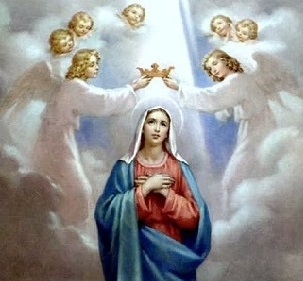Assumption of the Blessed Virgin Mary
Mary is taken up to heaven; she is in glory, like a queen arrayed in gold. The feast of the Assumption celebrates God’s reward to Mary for being the mother of her Son Jesus. The Book of Revelation (Rev 11:19; 12:1-6, 10) provides an insight into this mystery of Mary as Mother of God.
The ark of the covenant brought the presence of God to the Israelites. Therefore the ark was specially revered until it was lost. Mary is the ark of the new covenant, Jesus. Bearing the Son of God in her womb, she brought the presence of God to humanity. Mary became the tabernacle for Christ who won victory over the evil powers of the world.
‘Mary Mother of God’ is an expression scandalous to many protestant Churches. There has been a struggle to explain adequately the mystery of Jesus as both man and God at the same time. Many in history have tried to explain the nature of Jesus and failed. Here are some of those heresies. This might help you clarify some misconceptions you may have.
Docetism (2nd Century) The Gnostics taught Jesus only appeared to have a human body and was not truly incarnate. Therefore Mary is not Mother of God. By denying Jesus had a real body, they also denied His suffering on the cross and the resurrection of the dead.
Arianism (4th Century) Arius of Alexandria taught that Jesus was a “creature” of the Father. According to his theology the Father created the Son as His first creation. The Son then created the universe. God then adopted Jesus as a son. Jesus was worshipped only because of His pre-eminence as the first creation. Therefore Mary cannot be truly Mother of God. The word ‘consubstantial’ was included in the creed by the Council of Nicaea as a response to this heresy.
Nestorianism (5th Century) Nestorius of Antioch taught that Mary only gave birth to Jesus’ human nature. He therefore would not allow Mary to be called “Mother of God” but instead wanted her to be called “Mother of Christ”. In essence, the heresy maintained Jesus was really two separate persons, and only the human Jesus was in Mary’s womb. The Council of Ephesus corrected this heresy in 431AD.
Adoptionism (8th Century) taught that Jesus in his humanity is not the true Son of God, only adopted. Therefore, Mary is not the mother of God. This heresy was condemned by the 2nd Council of Nicaea and the Council of Frankfurt.
In all these heresies, we see intellectual attempts to explain the nature of Jesus and it failing. Jesus, as God incarnate is a mystery, just as love is a mystery. No one can adequately define or explain love. Yet everyone knows what love is. Everyone can experience love. Similarly God is to be experienced, not to be defined or explained.
The assumption of Mary is a reminder for us that God loved Mary and assumed her to heaven at the end of her earthly life.
Today we are also reminded that Mary, now in heaven, can intercede for us before God. Therefore keep up your devotion to Mary.

